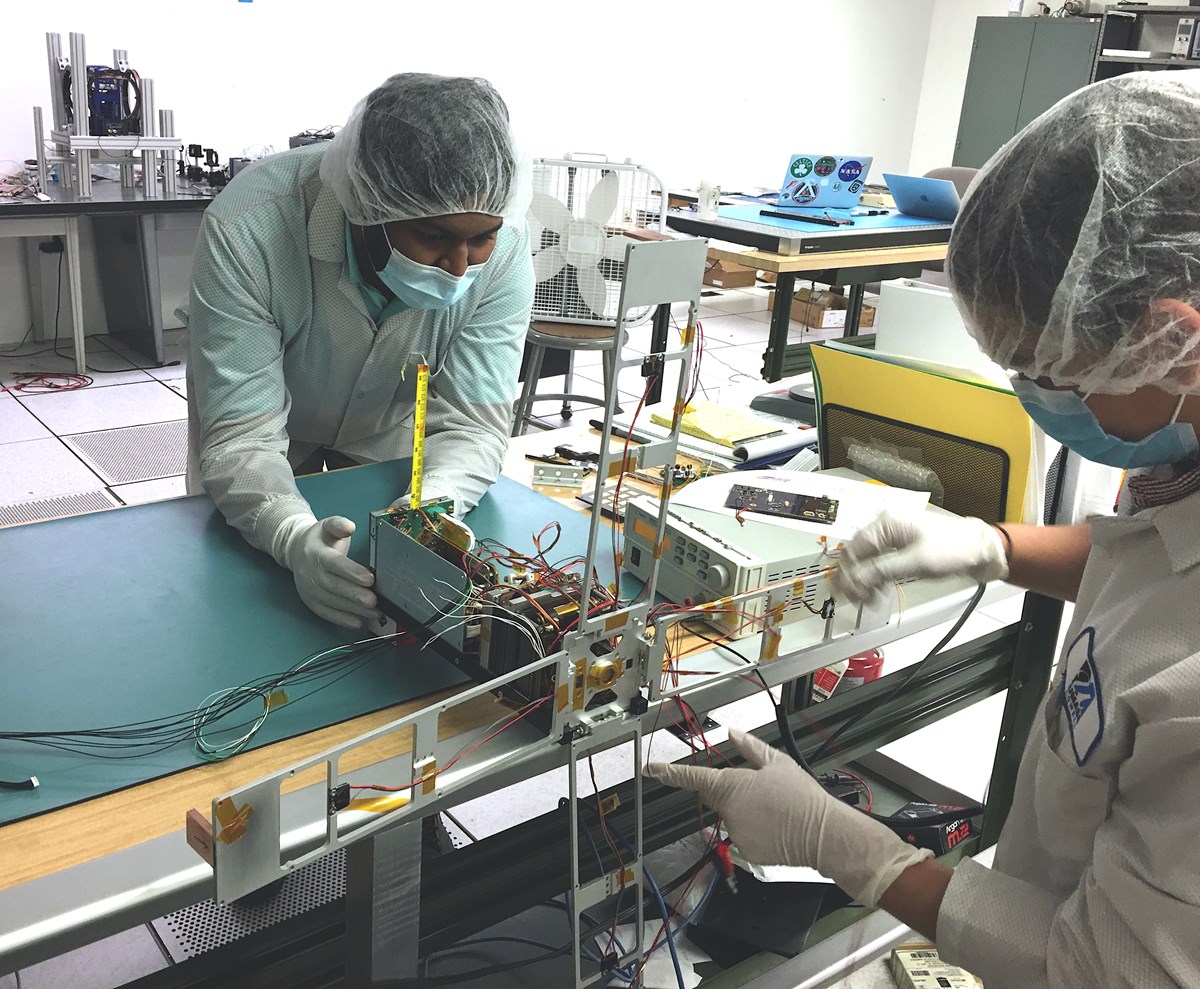Welcome to the May edition of A Capitol View
SMI continues to assist a variety of clients in advancing the nation’s historic clean energy goals. In April, we were honored to help galvanize several game-changing projects.
They include building a first-of-its-kind rare earth magnet manufacturing facility, increasing the production of clean hydrogen, securing more domestic sources of nickel and cobalt for electric vehicles, and meeting growing demand for fuel cell engines.
The projects: Our energy team assisted multiple clients in getting selected for the Qualifying Advanced Energy Project Credit that was expanded under the Inflation Reduction Act with a total of $10 billions in investments.
Scaling up: MP Materials qualified for $58.5 million to support construction of the nation’s first fully integrated rare earth magnet manufacturing facility in Fort Worth, Texas, to produce Neodymium-iron-boron (NdFeB) magnets. They are needed in the electric motors and generators that power hybrid and electric vehicles, robots, wind turbines, drones, electronics, and critical defense systems.
MP Materials expects production of precursor materials to begin this summer and finished magnets by late 2025. MP will supply the magnets to General Motors to support its North American EV production.
Going with the flow: Nel Hydrogen also qualified for a $41 million investment to produce green hydrogen through the electrolysis of water at an expanded facility near Detroit, Michigan.
“When fully developed, the facility will be among the world’s largest electrode facilities, where Nel will manufacture its next generation pressurized alkaline and [proton exchange membrane (PEM electrolysis] technologies,” the Department of Energy said.
Shiny and new: Nth Cycle, a leading refiner of metals, qualified for $7.2 million in tax credits to establish the nation’s first large-scale production of mixed hydroxide precipitate in Fairfield, Ohio.
The facility will deliver domestic nickel and cobalt to greatly reduce dependence on metals that are “crucial for helping battery companies comply with the Inflation Reduction Act’s requirements for EVs,” DoE said.
‘Greatly amplify’: SMI client Nuvera Fuel Cells also qualified for $14.1 million under the tax credit program to expand its facility in Billerica, Massachusetts, that is manufacturing fuel cell engines.
The award, on top of $30 million award from DoE in March, “will help provide Nuvera a path for increased production of our fuel cell technology at volumes designed to meet anticipated growth in demand for zero-emission power solutions for a myriad of applications,” said Kedar Murthy, the company’s chief commercial officer.
Fierce competition: The projects were among those selected out of 250 proposals reviewed for technical and commercial viability and environmental and community impact.
What’s next: The Biden administration is gearing up for the next round of tax credits. It has released the latest guidance for forthcoming proposals “to build clean energy supply chains and drive advanced energy project investments.”
The IRS also released the final rules on a related set of tax credits geared towards local and state governments, tax-exempt organizations, and businesses that “could not fully benefit from tax credits like those that incentivize clean energy construction.”
In addition, the Treasury Department released final rules on the clean vehicle provisions of the Inflation Reduction Act aimed at lowering consumer costs as a way to get more clean vehicles on the road.
 BREAKING GROUND: SMI client Syensqo, meanwhile, broke ground in Augusta, Georgia, on what will be the largest EV battery materials facility in North America.
BREAKING GROUND: SMI client Syensqo, meanwhile, broke ground in Augusta, Georgia, on what will be the largest EV battery materials facility in North America.
The plan will produce polyvinylidene fluoride, a plastic that increases the power and life of electric batteries.
Jobs boom: The project, made possible with an $178 million investment from the Department of Energy, will create hundreds of highly skilled and related jobs. The company is also investing $1 million to help expand workforce training for underrepresented and economically disadvantaged communities.
“We are translating our ambitions to help protect our planet and advance humanity into action,” said CEO Ilham Kadri.
Also on hand for the event was Tom Perez, director of the White House Office of Intergovernmental Affairs.
‘THE NEXT LEVEL’: Developing the domestic supply of lithium is also crucial to the nation’s energy transition. Now, a landmark new alliance is going to propel those efforts.
Standard Lithium, a leading commercial developer of lithium for renewable and low-carbon energy solutions, has entered a partnership with Equinor ASA to accelerate its extraction efforts at the mineral-rich Smackover Formation in Arkansas and Texas.
Equinor is investing up to $160 million to help the SMI client develop a sustainable lithium business that is critical for electric vehicles and energy storage.
“One thing that we have observed in the lithium world over the past decade is that strong, mutually aligned partnerships are the key to successful project execution and operation, and we believe we have aligned with the right partner to take SLI and the lithium industry in Arkansas and Texas to the next level,” said Standard Lithium President and CEO Andy Robinson.
OUT AND ABOUT: Leading members of SMI’s energy team have also been helping shape the broader conversation about meeting the nation’s clean energy priorities.
SMI VP Samm Gillard delivered a presentation on “Successful Engagement Strategies for DoE Support” at the Battery Council International annual convention in Fort Lauderdale, while Jeff Leahey helped organize a briefing on Capitol Hill on the domestic rare earth metals sector.
On the air: And SMI VP David Howell joined Steve LeVine, editor of The Electric newsletter at The Information for a discussion on “Navigating the IRA and China During a Pivotal Election Year.”
You can watch the full session on SMI’s YouTube channel.
SMI SPOTLIGHT
 SHARPER ADVICE: We are pleased to announce that Kirk McConnell, who brings more than three decades of experience managing technology policy on the Senate Armed Services Committee and the House Permanent Select Committee on Intelligence, has come aboard as our latest senior advisor.
SHARPER ADVICE: We are pleased to announce that Kirk McConnell, who brings more than three decades of experience managing technology policy on the Senate Armed Services Committee and the House Permanent Select Committee on Intelligence, has come aboard as our latest senior advisor.
Kirk has played a critical role shaping cyber, quantum computing, and microelectronics policy, including the landmark CHIPS and Science Act. He has also managed the gamut of intelligence as well as Army and Navy programs.
‘A wealth of knowledge’: “Kirk has been a critical player in the authorization of nearly every emerging technology for national security,” said SMI President and CEO Bill McCann. “He brings to SMI and to our clients a wealth of knowledge, insights and contacts that will ensure that we understand and can support our nation’s current and future requirements in AI, cybersecurity, quantum computing and microelectronics. We are thrilled to have Kirk as part of the greater SMI team.”
Kirk’s other areas of expertise include 5G wireless networks and applications; information operations; electronic protection; personnel security reform; and insider threat monitoring.
He earned B.A. degrees in history and political science from the University of Rochester and an M.A. in international affairs from The George Washington University.
Check out our full roster of SMI senior advisors.
NO SIGN OF A SLOWING DOWN: Shepherding what’s next has always been SMI’s compass. Whether it’s helping expand our sources of clean energy, revitalizing domestic manufacturing, advancing national security, or helping transition new medical therapies, our record on behalf of innovators is turning more concepts into capability than ever before.
In the latest POLITICO roundup of quarterly lobbying stats, SMI was highlighted for $3.9 million in revenue so far this year, versus $2.8 million during the last quarter of 2023 and $2.9 million in the first quarter of 2023.
“In the last year, we’ve been lucky to add a number of great hires from Capitol Hill, including Rebecca Gansca, Celia Morté, Stephen Coffey, and Nicholas Vance,” said Bill McCann. “We are seeing growth in both the number of clients and revenue as a direct result from building out our team.”
BUDGET
 BUSTING OUT: The spending caps enacted last year under the Fiscal Responsibility Act are bearing down on congressional deliberations over federal appropriations for fiscal 2025.
BUSTING OUT: The spending caps enacted last year under the Fiscal Responsibility Act are bearing down on congressional deliberations over federal appropriations for fiscal 2025.
Bipartisan leaders on the Senate Appropriations Defense Subcommittee have called the limits inadequate and vowed to work to increase funding levels. But the Democratic side is unlikely to go along unless non-defense budgets are equally boosted.
‘Parity’: “For me, the word of the day, today – and every day until we pass our funding bills – is going to be parity,” Sen. Patty Murray (D-WA), chair of the full Appropriations Committee, said this month.
Chopping block: The bipartisan budget deal capped all defense spending at $895 billion for the fiscal year that begins Oct. 1, “ensuring the Defense Department would have to cut procurement and modernization accounts,” said SMI VP Maria Bowie.
Those caps allow only for a once percent increase in defense spending, even though inflation rose 3.4 percent in 2023.
A shot in the arm: The recently passed supplemental spending package for Ukraine and Israel will ease some of the pressure, particularly for some needed investments in the defense industrial base. But “funds for modernization will be squeezed by inflation, personnel and healthcare costs, reducing investments in military capabilities,” Maria asserts.
Policy update: It looks like when it comes to the National Defense Authorization Act, the annual defense policy bill, the House Armed Services Committee plans to stick with the caps, at least “for the moment,” in the words of panel chair Rep. Mike Rogers (R-AL).
The latest we’re hearing is that the House version of the NDAA will skip subcommittee mark-ups this season and the chairman’s mark will undergo review by members’ staff next week, with an amendment deadline set for May 16.
The full committee mark-up is slated for May 16 and the bill could hit the House floor by the week of June 10.
STRATEGIC COMMUNICATIONS
 MEETING THE MOMENT: The federal government and the space industry are facing enormous challenges in inspiring and nurturing the new pioneers who will lead us in the next chapter of the space age.
MEETING THE MOMENT: The federal government and the space industry are facing enormous challenges in inspiring and nurturing the new pioneers who will lead us in the next chapter of the space age.
SMI client University of Massachusetts Lowell, a Minority Serving Institution, is at the forefront of training a new generation of tinkerers to shoot for the stars in science, technology, engineering, and math.
A growing portfolio: The Lowell Center for Space Science and Technology offers a diverse range of research projects, from developing new tools to identify black holes and stars to creating computer models describing space weather effects and maturing technologies to image planets around nearby stars.
The National Science Foundation is helping the university create tenure-track faculty positions, while its space technology portfolio is poised to expand as part of the recently announced Lowell Innovation Network Corridor.
‘Motivating power’: Supriya Chakrabarti, director of the space center, has issued a call to action to leverage the upcoming centennial in 2026 of Robert Goddard’s maiden launch of a liquid-fueled rocket to help inspire a new generation of space pioneers.
“Our experience gives us a deep appreciation of the motivating power of learning by doing – by tinkering,” he writes in Space News. “We can ignite that new generation of tinkerers on a grander scale, with a nationwide contest involving students in all 50 states to design and build small satellite prototypes to commemorate Goddard’s achievement.”
“The approaching centennial is just what we need to fuel a new generation of space pioneers,” he added, and “presents a once-in-a-generation opportunity for a national initiative that could help invigorate the STEM curriculum like the Apollo moon program first did in the 1960s.”
The big pitch: “We urge government agencies — NASA, the U.S. Space Force, the National Science Foundation, the Federal Communications Commission — and leaders in the space industry to come together to seize this opportunity by mentoring students and providing launch operations and mission control for a nationwide commemoration,” Chakrabarti added.
Read the full column: Let’s shoot for the stars like Robert Goddard
TECHNOLOGY
 ‘NEW INDUSTRIAL REVOLUTION’: NVIDIA, the Silicon Valley tech company, has invested $213 million to build a new research facility at Oregon State University, positioning the SMI client to be at the forefront of the digital revolution.
‘NEW INDUSTRIAL REVOLUTION’: NVIDIA, the Silicon Valley tech company, has invested $213 million to build a new research facility at Oregon State University, positioning the SMI client to be at the forefront of the digital revolution.
“We’re at the beginning of a new industrial revolution, and the reason why I say that is because an industrial revolution produces something new that was impossible to produce in the past,” CEO Jensen Huang said in marking the groundbreaking for the new complex.
The announcement follows a grant from NVIDIA to another SMI client, the University of Florida, for an AI training center.
DOMESTIC MANUFACTURING
 FOOTLOOSE: The United States Footwear Manufacturers Association, with SMI’s help, secured $10 million in research funding for military footwear in the recently passed Fiscal 2024 Defense Appropriations Act, a testament to the growing appreciation in Congress for the need to invest in our domestic footwear industrial base.
FOOTLOOSE: The United States Footwear Manufacturers Association, with SMI’s help, secured $10 million in research funding for military footwear in the recently passed Fiscal 2024 Defense Appropriations Act, a testament to the growing appreciation in Congress for the need to invest in our domestic footwear industrial base.
The appropriation will provide the domestic footwear industry with more research and development funding for prototyping and piloting new technologies to improve footwear for our troops and strengthen the Berry Amendment, which restricts the use of federal funds for clothing, fabrics, and other textiles “not grown, reprocessed, reused, or produced in the United States.”
“By investing directly in the research and development of U.S. footwear manufacturing, there will be a natural growth in the U.S. supply chain, which will help to drive renewed growth of U.S. jobs,” said SMI Director Karlee Popken, USFMA’s trade policy director.
Lacing up: USFMA also welcomed to the fold La La Land Production and Design, a premier leather footwear maker based in Los Angeles, as the association strengthens its collective voice in Washington.
Founded by CEO Alexander Zar in 2005, La La Land produces custom leather shoes, sandals, sneakers, and handbags. It has a big vision for collaborating with the federal government to expand domestic manufacturing and grow its skilled workforce.
“I’ve never had a voice in Washington and USFMA has the on-the-ground experience and track record,” said Zar. “My goal is to significantly increase domestic production capacity in order to serve larger brands here in USA. With technologies like 3D bonding, direct injection soleing, and robotics, we can achieve a competitive price point domestically and train a new generation of footwear manufacturers.”
Policy focus: The association has also been an increasingly vocal proponent of passage of the Import Security and Fairness Act to close the de minimis loophole that allows packages valued at less than $800 to avoid customs duties and taxes.
“Every day, an astonishing three million import packages ordered online enter the United States without scrutiny, evading fair trade penalties, standard tariffs, and taxes,” said USFMA Executive Director Bill McCann. “The use of the de minimis loophole has skyrocketed, with a staggering 485 million packages entering the United States as of March 1, 2024. This trend directly undermines domestic footwear manufacturers and their suppliers.”
DEFENSE
 POWERING THROUGH: The Pentagon’s aggressive effort to field a universal tactical battery to power aircraft, ground vehicles, and other military equipment achieved a major breakthrough with the successful military qualification testing for SMI client EXO Charge’s Small Tactical Universal Battery.
POWERING THROUGH: The Pentagon’s aggressive effort to field a universal tactical battery to power aircraft, ground vehicles, and other military equipment achieved a major breakthrough with the successful military qualification testing for SMI client EXO Charge’s Small Tactical Universal Battery.
“This milestone marks a significant step towards providing advanced power solutions to our military forces,” said CEO David Bailey. “The demand for STUB is increasing aggressively, and we are actively exploring ways to increase and expand. This is an exciting time for our organization.”
‘Game-changer’: EXO Charge, a division of SMI client Xentris Wireless LLC, was selected by the Defense Innovation Unit in December to prototype a design “that allows warfighters to swap batteries between devices, or transfer power between batteries, a game-changer for mobility in combat.”
Now that the battery technology has surpassed stringent military requirements, it has entered low-rate production at the company’s state-of-the-art facility in Illinois.
LIFE SCIENCES
FO R THE LIFE OF ME: SMI is a leading partner of universities, nonprofits, and companies seeking to tap into federal support for their breakthroughs in medical diagnostics and treatments.
R THE LIFE OF ME: SMI is a leading partner of universities, nonprofits, and companies seeking to tap into federal support for their breakthroughs in medical diagnostics and treatments.
But how to navigate the process – from basic research to clinical trials to procurement and everything in between – can often be exceedingly difficult and replete with bureaucratic hurdles and funding setbacks at agencies ranging from the Department of Defense to the National Institutes of Health, the Advanced Research Projects Agency for Health), and the National Science Foundation.
Dread not: SMI VP Travis Taylor has developed a high-impact strategy to identify the right funding streams, build the strategy, and execute best practices for the sustained engagement that is required to get through what he calls “the dreaded development pipeline.”
In April, he shared his experience at a day-long workshop on federal funding at the University of Tennessee, along with reps from the National Institute of Allergy and Infectious Diseases, the Congressionally Directed Medical Research Program, and the Medical Technology Enterprise Consortium.
CLIENTS IN THE NEWS




